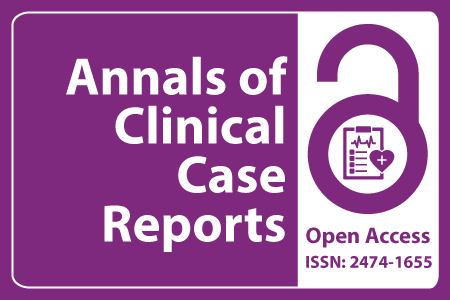
Journal Basic Info
- Impact Factor: 1.809**
- H-Index: 6
- ISSN: 2474-1655
- DOI: 10.25107/2474-1655
Major Scope
- Oncology Cases
- Radiology Cases
- Cardiovascular Medicine
- Allergy & Immunology
- Palliative Care
- Urology Cases
- Orthopedic Surgery
- Physical Medicine & Rehabilitation
Abstract
Citation: Ann Clin Case Rep. 2024;9(1):2623.DOI: 10.25107/2474-1655.2623
Neonatal Propionic Acidemia with Dyspnea as the First Manifestation: A Case Report
Xue Y1, Xiang S1, Ma C1, Liu Q1, Xie J2 and Lin H1*
1Department of Neonatology, Yunyang County People's Hospital, Yunyang County of Chongqing, China
2Department of Respiratory Medicine, Children’s Hospital of Chongqing Medical University, China
PDF Full Text Case Report | Open Access
Abstract:
Propionic Acidemia (PA) is a disorder in organic acid metabolism resulting from a genetic defect in propionyl CoA carboxylase. Due to its inconspicuous clinical manifestations, misdiagnosis, missed diagnoses, and delayed treatment are prone to occur. Here, we present a case of a newborn infant with PA admitted to our hospital, exhibiting dyspnea as the initial manifestation. A 2-day-old newborn was admitted due to dyspnea and nasal congestion, presenting with physical examination findings of a high respiratory rate, lower blood oxygen saturation, and shortness of breath. Laboratory findings corroborated the presence of metabolic acidosis and increased ketone bodies in the urine. Additionally, blood tandem mass spectrometry showed raised levels of propionyl Carnitine (C3), while the urine organic acid test revealed a more than tenfold increase in the levels of 3-hydroxypropionic acid-2 and methyl citrate-4. Genetic analysis revealed compound heterozygous mutations in the PCCB gene: c.733G>A (p.G245S) and c.181C>T (p.R61X), which were inherited from the father and mother, respectively. Following several days of treatment, the baby was discharged from the hospital and exhibited normal growth and development until the age of 1 year. Clinicians should consider propionic acidemia in newborns presenting with unexplained shortness of breath, difficulty feeding, and uncorrectable metabolic acidosis. This report identifies new heterozygous mutations in the PCCB gene: c.733G>A (p.G245S) and c.181C>T (p.R61X).
Keywords:
Propionic acidemia; Neonatal; Dyspnea; PCCB gene
Cite the Article:
Xue Y, Xiang S, Ma C, Liu Q, Xie J, Lin H. Neonatal Propionic Acidemia with Dyspnea as the First Manifestation: A Case Report. Ann Clin Case Rep. 2024; 9: 2623..













